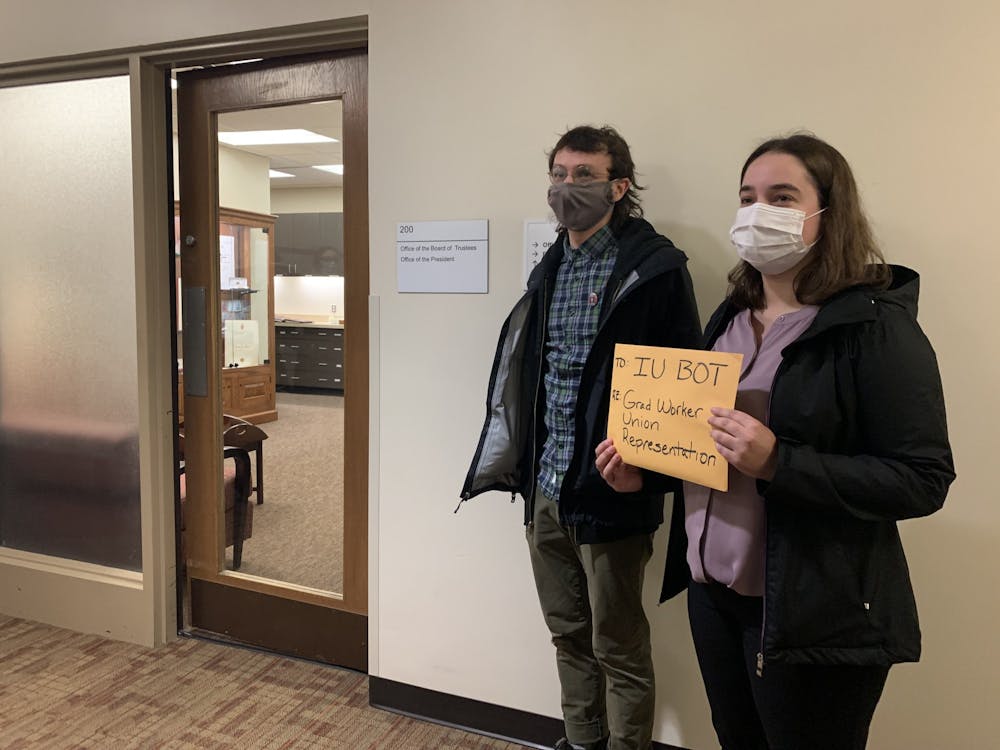IU refused to recognize or negotiate a union contract with the Indiana Graduate Workers Coalition-United Electrical Workers on Tuesday.
This comes more than two months after the organization submitted a formal request to the Board of Trustees to hold a union election. A union election can certify the IGWC-UE as a union bargaining with IU on behalf of graduate workers.
Interim Provost and Executive Vice President John S. Applegate sent a letter to the IGWC-UE at 5:16 p.m. on the Tuesday deadline the IGWC-UE had set in their December formal request for IU to hold a union election. Applegate’s letter denied the organization’s demands for recognition and bargaining.
In a press release in response to Applegate’s letter, the IGWC-UE expressed disappointment at the university administration’s refusal to engage in a dialogue with the organization or address graduate workers’ grievances.
“We had hoped that IU would be different and would be enthusiastic about creating a productive working relationship that would serve the university as a whole,” the release stated. “Unfortunately, that does not seem to be the case.”
[Related: Grad student workers disagree with IU on a big issue: How much is their work worth?]
The IU Graduate and Professional Student Government’s voting body, the general assembly, passed a resolution Friday with 60 votes for yes and one abstention. The resolution encouraged graduate workers to unionize and urged IU to bargain with all IU workers hoping to hold union elections.
“We encourage graduate student workers to take the necessary steps to form a labor union including voting ‘yes’ in a union election,” the resolution reads.
Applegate argued in his letter that IU’s graduate workers are not staff employees, but rather academic appointees. He said academic appointees are not covered by an IU human resources policy which requires 30% of a staff unit to petition in favor of a union election before such an election can be held.
Members of the IGWC-UE disagree with Applegate, arguing they teach nearly 700 classes and perform important research that contributes to millions of dollars in grants for IU.
“The letter astonishingly suggests that graduate workers are not really workers – even though graduate workers perform much of the labor crucial to IU’s mission,” the IGWC-UE press release stated.
More than 60% of all IU’s graduate workers had signed union cards in favor of a union election as of December, when the IGWC-UE submitted the cards and a letter to the Board of Trustees requesting a union election.
Even if IU recognizes the IGWC-UE, which it does not, neither state nor federal law obligates IU to bargain with the organization, Applegate wrote in the letter.
Joseph Varga, assistant professor of labor studies at IU-Purdue University Indianapolis, confirmed that under Indiana law, the university administration is under no legal obligation to recognize the IGWC-UE as a collective bargaining unit.
“Our graduate students here have a good moral and ethical argument to be recognized as workers – which they are; they produce for the university,” Varga said. “But the legal grounds are more difficult because they are public sector employees.”
Sam Smucker, IGWC-UE member and IU Ph.D. student, said IU should recognize the organization as a union because most graduate workers have agreed to a union election. He said although it has no legal obligation to do so, it is the right thing to do.
“People are outraged by what the university is saying,” Smucker said. “Saying that we're not workers is so absurd that it just drives people to be a part of the union and to want to get involved, so the union is stronger than ever.”
Cole Nelson, IGWC-UE organizer and spokesperson, said if the university is still not willing to negotiate, then the coalition will use that strength to put pressure on the university to grant them a path toward unionization.
“That could indicate a broad range of escalating practices,” he said, “from picket lines at administrative buildings, to sit-ins, to walk-outs to, heaven forbid, a broad range of graduate workers falling down with some sort of sickness and having to call out sick one day.”
The IGWC-UE has not ruled out the possibility of striking to achieve recognition.
“If the university is indicating that they are, against all measures, unwilling to engage with us, then they're opening up the possibility that graduate workers go out on strike and quit performing the labor that is so necessary for the university and that they so little pay us for,” Nelson said.
The organization is starting with a “work-in” scheduled for 2:30 p.m. on Feb. 15. Graduate workers will meet at Franklin Hall, then split into groups to perform their duties in offices around campus to demonstrate they work for IU just as staff members do.
As of noon on Monday, the IGWC-UE Union Organizing Fund has raised more than $7,000, 99% of which was raised since Applegate sent the letter refusing to grant the organization union recognition Tuesday, according to its GoFundMe page.




